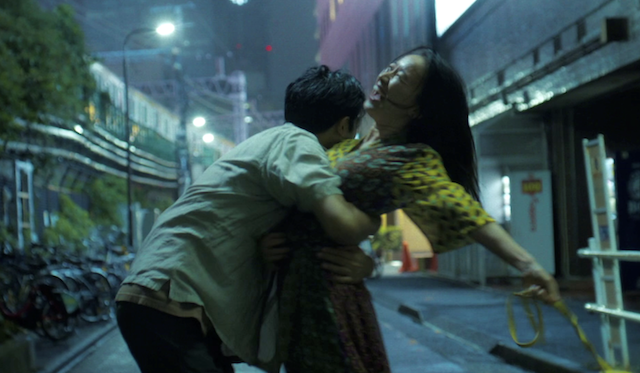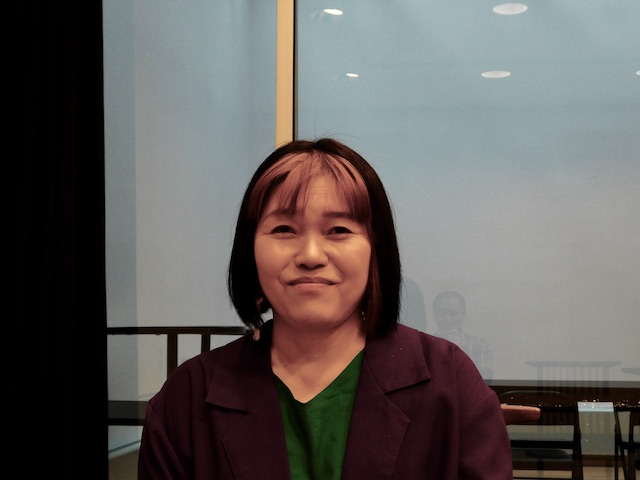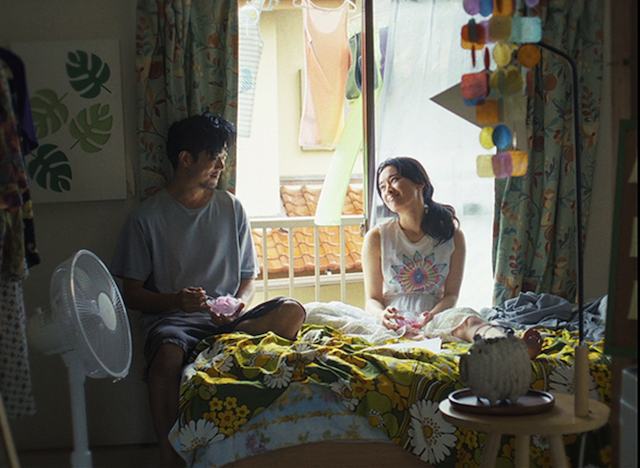
©PKFP PARTNERS

Q : The film begins with a character Kaoru who has already passed away, and the way she was told who she was by those around her, similar to Citizen Kane, is captivating.
Noriko Yuasa: In terms of the trigger, a friend of mine who was about my same age passed away several years ago, and it was really sudden. So it was very simple, but I could not find any answer myself as to why people die—either at the funeral or afterwards. Since I am doing this type of work(as a filmmaker), I have a desire to find a solution to this question by constructing a film and a book (screenplay) of my own. I told Mr. Nishi (Takahito=co-writer), with whom I had worked on previous short movies together, that I really wanted to make a movie on this theme.
The logline for the film says that a woman passed away and left a will. I told him that it was her will said that her ex-husband would be a pallbearer at her funeral. I asked Mr. Nishi if he would attempt to create a feature film regarding it. This was roughly seven years ago during this period.
Q: So it took quite a long time to get into production?
Noriko Yuasa : We initially planned to collaborate with a producer who lives in New York. But the Covid was the real problem, and as everyone knows, New York had been experiencing a lot of hardship. I was contemplating the idea of producing and directing at that moment. The current chief producer, who was the first associate at that time, told me she would want to become the chief producer. When the time was right [after Covid], we would shoot the film. The reason it took as long as it did is because of that.
Q : This film is a joint production. How did you end up making a joint production with Spain and Singapore?
Noriko Yuasa: When I make an original feature film project, I always think that co-production is the way to go. If I did not change anything, it would have been the norm to shoot and produce films with Japanese staff and Japanese financing.
In my situation, things were not going to change by themselves, and when I went abroad to make short films and participate in film festivals, I had the chance to study [these factors]. I comprehended that in countries other than Japan, filmmakers see co-production as a standard practice.
I felt that there was no reason why I should not do it. When it came to this film, the executive was changed, but of course, it is a funeral film, and in order to make a Japanese funeral film, the art design and cast could not be non-Japanese. Our objective was to find skilled individuals for both the technical and music departments, regardless of their nationality, but we ultimately requested that they be from Barcelona. We began there and subsequently our producer and Joan(Vilà), the music composer, chose to collaborate since they already had a relationship. That’s how it ended up.
As for Singapore, this project is part of the TIFFCOM market of the Tokyo International Film Festival (TIFF), which is now in its fourth year. TGF (Tokyo Finance Market) was a multi-content market that was attached to TIFF and aimed to connect content holders with co-production companies, with financing from different countries included in the project.
Our film was one of the two selected on the Japanese side for the first festival, and we were also selected for the Tokyo Film Festival. So after talking with people from companies in about 30 countries in a Zoom meeting, we decided to work with a company called 108 Media from Singapore.
Q: In this film, the main character interacts with a funeral director, and the story unfolds. Did you do a lot of research on funeral directors beforehand?
Noriko Yuasa: That’s right. Thanks to the support of various companies and local governments, 60% to 70% of the film, including funerals, was done in Okayama Prefecture. But, oddly enough, after about two years of location hunting in preparation for the film, I was introduced to various locations by funeral directors, temples, and various other places, and a strange kind of connection and community developed.
We encountered individuals, even though they were funeral directors, there were those who primarily operated a ceremonial hall and those who primarily dealt with private funerals. There are various approaches to thinking nowadays, and each funeral director was very clear about their stance. However, the important thing is that each funeral director has his or her own thoughts and feelings about the people he or she is sending home. I was very grateful that I was able to understand how each funeral director felt about sending people home.
In addition, of course, temples involvement, they are also involved in the Buddhist rituals and other matters related to the life and death of the deceased, and they also have the important role of protecting the graves of those who die. In the end, our film was made at a Soto Zen temple, and thanks to that, people from various religious sects were able to talk to us and teach us.
Q: Kaoru herself died in an accident, and her face was covered in bruises and blood, but afterwards, makeup was applied to her face and she was sent off in a clean and beautiful way, like in the movie Departures.
Noriko Yuasa: I think this is the first part you mentioned, but it’s a bit about embalming. Departures is just a simple make-up job, but embalming is something that can really make a person’s body revive their flesh. The person who touched up Kaoru was the person who was really doing the embalming.
I talked to the embalmers, and they told me that they would rather have me use their facilities as they are than make something up. They said, “If you want to use us, you can use us as is, rather than making things up.” We were allowed to work with the real results.

©PKFP PARTNERS
Q: The film that I saw has a very interesting accent in the use of sound. In the beginning of the film, when there is a lot of information being exchanged in a hurry, there is the sound of drums, and when time passes slowly, there is the sound of a clock or a wind chime. What kind of discussions did you have with the composer from Spain prior to make this film?
Noriko Yuasa: This process was actually a story that took a very, very long time. This music department itself is usually very good at making grand, melodious music, like by composer John Williams. I told them that I thought the theme of the music this time was absurdity, and we talked about how to choose the instruments that best fit the absurdity, and what would be the best way to depict that melody, I went to Barcelona for three months, and I spent at least a month there discussing these issues. in the end, after talking about various things, we decided that percussion would be the best choice.
Q: The cast members in the film are not actors that we are familiar with, but I felt that each one of them played their roles with great care. How did you cast them, and what kind of rehearsals did you do prior to making the film?
Noriko Yuasa: This time, as you mentioned, my only wish—or rather my only hope—regarding casting was to have an audition instead of an offer casting. The reason for this is that I wanted to work on this ensemble piece with wonderful and powerful actors, regardless of their fame or if they were unknown.
Based on the title, I assume it is about Kaoru. However, since it is an ensemble drama with Kaoru playing a key role, we sought out the appropriate individuals to portray and express these characters. So we had about 1,000 people gather in Tokyo, Okayama, etc., and we had them all perform, and the Covid was the result. I don’t know if it was good or bad, but we were able to do it via Zoom, but we couldn’t see the performance, so we did several Zoom sessions, and in the end, we actually met in person.
I had to wait for about two years before the shooting, so I had already given the script to everyone, and they had read it so well that I had nothing to say to them. I guess you could call it a timeline of life: I had given a timeline of a character’s life to each of the cast members, so they had really read and prepared for the show over the course of two years, I didn’t have anything special to say to them, and when the time came for the costume fitting, we talked about it and rehearsed on the set.
Q: Each and every one of the actors, whether in a leading or supporting role, seemed to come alive, just like in an Akira Kurosawa movie.
Noriko Yuasa: Yes, I am really happy to hear that praise. I think we have a really wonderful team of actors.
Q : Japan Cuts, which is being held at the Japan Society in New York this time, will be seen by both Japanese residents and non-Japanese New Yorkers, including Americans. What do you hope New Yorkers will see?
Noriko Yuasa: There are many things, but one major one is about the public image of Japanese people: that they are very polite, always say yes, never say no, and do not change their facial expressions much. Many of the key visuals in the film contribute to this image and feature stylistic beauty, in contrast to the many works that are comprehensive, I think that this work is the complete opposite.
People are rude, they say rude things, and they make a big fuss about wanting to answer your questions. But what I wanted to portray was that this is what I think is normal for Japanese people, I hope that you will feel something of the ordinary things that happen in life: death, crying, laughing, and so on. One thing I remember very well is a scene where there is a huge fight on the night of the wake. As I mentioned earlier, our cinematographer and lighting team were all from Barcelona. When I saw them rehearsing that scene, they laughed.
Of course, they had read the script, so even though they knew most of those words, that’s not what they were laughing about, I asked them what was so funny, and they said, “no, the same thing happens in Barcelona.”
I guess what they were saying is the universal basis of your hometown, where you can feel the people, the food, and the sociality of the place where you were born and raised. The other thing is that I made this film because I wanted to somehow answer the question of why people die, and I am sure that everyone will have their own answer, I hope that after watching the end roll, you will wonder why people die. That said, I don’t mind not knowing the answer after all….
Q: This is the final question. The producer involved with Kaoru’s drama states that in Japan, scripts without an original story are not acceptable. What do you think is lacking in current Japanese films and what do you desire to change?
Noriko Yuasa: Yes, I have been asked about that quite often, and the part of the line that he (the producer) was talking about is what I definitely think. The line itself was written by me, so I definitely think it is exactly as it is, and it is neither more nor less than words. But, I might add, it’s a movie.
But I would like to add that I don’t think it’s just because it’s a movie. The world is moving rapidly, and in my own career, more than half of my time has been spent making things for television, but I have also been thinking about the current economic situation and the importance of film and television in our society. I believe that there should be more diversity in the way films and TV are made, the way they should be made, and the way they should be organized, in the face of many problems, such as the cost of advertising and other economic issues.
I think it is just going against the times to continue doing things one way and for decades. Of course, I think it’s fine to have that way of doing things. It is traditional. I think it is fine to have other ways of doing things, but I think we should try our best to find other ways of doing things now—or rather now that we are already behind the times,
It is my hope that my generation and others must go out and find new ways of doing things, with the vigor of digging a well with a tsuruhashi (a pick-like tool with a pointed tip and a long, protruding head on either side connected at right angles to the handle portion). It is my hope that, if possible, the soil of Japan will become a global arena in which people from all walks of life can come up with different ways of doing things.
I don’t know what the reality will be, and I am not an optimist in that area, so in answer to your question, I think I have to do it by myself now. This film also does not have a Tokyo-based company in it, and if this had been approached via the Tokyo-based production committee system, which is the base I always work with, this film would never have been made.
I was able to make this film with this quality because it was an international co-production in Okayama, a place with a regional focus. I definitely would not have been able to do it otherwise, and I don’t think it would have been possible if it had not become a film in my own way. In fact, when it first became a script, it was from the last competition of a major project, so I think the facts already prove it.
I don’t want to say that just because I couldn’t make it at that time—it is okay to say that I can’t. So I think it would be good if society could be more tolerant and diverse in its way of thinking. So, even if I have to do something, I will work to find a method to continue creating, I think it would be good if we could create a society that is tolerant and diverse in this way of thinking.
As I mentioned earlier, if a person has talent and thinks a project is interesting, he or she should be able to move the project forward, regardless of who he or she is. I think the answer to this question is that in Japan, almost no one, male or female, can do it, and I think it is very intolerable that no one can do it without the so-called original work or without the original manga.
Q: I think there are many good Japanese films at Japan Cuts and the New York Asian Film Festival held at Lincoln Center, and I think there is still a lot of hope.
Noriko Yuasa: I am glad to hear that there is hope, but as I said before, I am not very optimistic. I think it’s better to think that we are on the precipice. I am on the edge, and if I don’t try, there is no way to go on, and that is the way I am going. But my own experience is that I really think we are already at the edge of a cliff.
If you like the interview, share your thoughts below!
Check out more of Nobuhiro’s articles
Here’s the trailer of the film.

